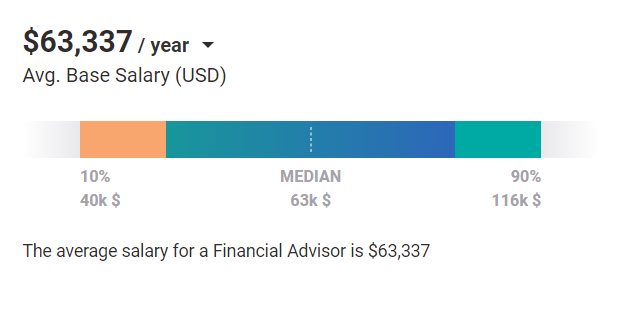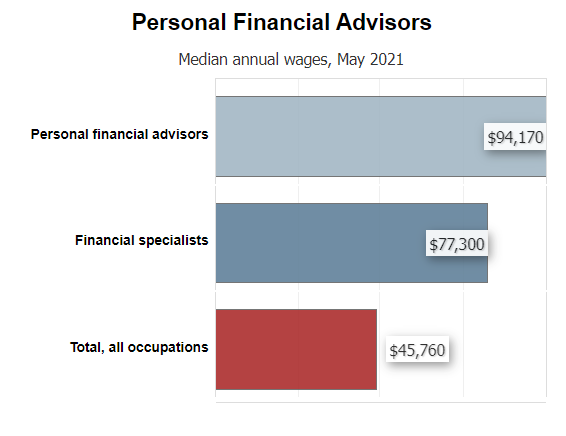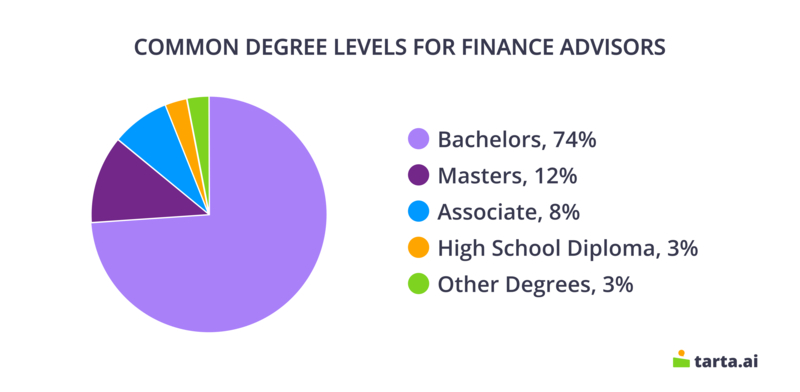Navigating Your Financial Future: The Role of Financial Advisors

"Financial planning and discipline is key to one’s financial freedom." -Kishorkumar Bapalli
Job description
Financial advisors are professionals who provide financial advice and services to individuals, businesses, and organizations. Their goal is to help their clients achieve their financial objectives by providing them with financial planning, investment, and other financial-related services.
They help clients make informed decisions about their finances, including budgeting, retirement planning, risk management, and tax planning. Financial advisors also help clients manage their investments, including stocks, bonds, mutual funds, and other financial products.
Requirements
To become a financial advisor, you typically need a bachelor's degree in finance, economics, business, or a related field. Some employers may also require a master's degree or a professional certification such as Certified Financial Planner (CFP) or Chartered Financial Analyst (CFA). Additionally, financial advisors need excellent communication, analytical, and problem-solving skills. They should be able to work independently and as part of a team, and have a good understanding of financial markets and investment products.
Main Responsibilities
The primary responsibility of a financial advisor is to provide financial advice and services to their clients. Some of their main responsibilities include:
- Conducting a thorough analysis of clients' financial situations to identify their financial goals, needs, and objectives.
- Developing a financial plan for clients, which may include investment strategies, budgeting, retirement planning, and risk management.
- Recommending investment products and managing clients' investment portfolios.
- Providing ongoing support and guidance to clients, including regular updates on their portfolios and investment performance.
- Staying up-to-date with the latest financial trends and investment products to provide clients with the best advice.
Additional Duties
In addition to their main responsibilities, financial advisors may also be required to perform other duties such as:
- Prospecting and acquiring new clients.
- Participating in networking events and marketing activities to promote their services.
- Meeting with clients and prospects to discuss their financial goals and objectives.
- Collaborating with other financial professionals, such as accountants, lawyers, and estate planners, to provide comprehensive financial planning services.
- Conducting research on financial markets and investment products to develop new investment strategies.
Note: Financial advisors may face regulatory scrutiny: Financial advisors are subject to regulatory oversight by organizations such as the Securities and Exchange Commission (SEC) and the Financial Industry Regulatory Authority (FINRA) to ensure that they are providing clients with appropriate advice and acting in their best interests.

Skills
Skills are an essential aspect of any profession, and financial advisors are no exception. As a financial advisor, you will need a combination of hard and soft skills to succeed in this profession. Below are some of the key hard and soft skills that are important for financial advisors:
Hard Skills | Description | Soft Skills | Description |
Financial analysis | Understanding financial markets, investment products, and financial analysis tools to help clients achieve their financial goals | Communication | Building and maintaining relationships with clients through effective communication |
Portfolio management | Excellent skills in managing investment portfolios effectively to meet clients' needs | Problem-solving | Analyzing complex financial situations and providing appropriate solutions for clients |
Risk management | Skilled in managing and minimizing risks to protect clients' assets and investments from market volatility | Emotional intelligence | Understanding clients' needs, emotions, and concerns and building trust with them |
Tax planning | Knowledge of tax laws and regulations to help clients minimize their tax liability and optimize their financial planning strategies | Time management | Meeting clients' deadlines and managing multiple tasks effectively |
Financial planning software | Proficient in using financial planning software to help clients create customized financial plans | Salesmanship | Acquiring and retaining clients and building a strong referral network through effective sales skills |
Salary
One of the most important aspects of any profession is the salary, which is a key factor for anyone considering a career in the financial advisory industry.
Average Salary
According to Payscale, the average salary for a financial advisor in the United States is $63,337 per year, with a reported salary range of $41,000 to $136,000. The top-paying states for financial advisors include California, New York, and Massachusetts.

Source: PayScale
The average salary for a personal financial advisor in the United States is around $94,170 per year, according to the Bureau of Labor Statistics (BLS).
Factors that Influence Earnings
Several factors can influence the earnings of financial advisors, including:
- Education and experience: Financial advisors with advanced degrees and years of experience typically earn higher salaries than those with less education and experience. Financial advisors with the Certified Financial Planner (CFP) designation can earn higher salaries than those without it.
- Industry: Financial advisors who work in high-paying industries such as investment banking, securities and commodities brokerage, and financial investment activities tend to earn higher salaries.
- Geographic location: As mentioned earlier, financial advisors in states with higher costs of living tend to earn higher salaries.
- Client base: Financial advisors who work with high-net-worth clients typically earn higher fees and commissions, resulting in higher earnings.
- Type of firm: Financial advisors who work for large financial firms tend to earn higher salaries than those who work for small, independent firms.

Source: U.S. Bureau of Labor Statistics
Ways to Improve Earnings
Here are some ways that financial advisors can improve their earnings:
- Increase client base: Financial advisors can increase their earnings by expanding their client base and acquiring high-net-worth clients.
- Specialize in a specific area: By specializing in a specific area of financial advising, such as retirement planning or tax planning, financial advisors can differentiate themselves from others and command higher fees.
- Pursue advanced education: Financial advisors can pursue advanced degrees and certifications such as a Certified Financial Planner (CFP) to increase their knowledge and expertise, which can lead to higher earnings.
- Work for a high-paying firm: Financial advisors can seek employment at high-paying financial firms or investment banks to earn a higher salary.
Additional Benefits
In addition to a base salary, financial advisors may receive additional benefits, such as:
- Performance-based bonuses: Financial advisors who meet or exceed their performance targets may receive bonuses in addition to their base salary.
- Commission-based compensation: Many financial advisors receive commissions based on the financial products they sell to clients.
- Health and retirement benefits: Financial firms typically offer health insurance and retirement benefits such as 401(k) plans to their employees.
- Flexible schedules: Some financial advisors enjoy flexible schedules, which can provide a better work-life balance.

Job environment
Financial advisors work in a variety of settings, including banks, insurance companies, investment firms, and independent advisory firms. Each setting has its own unique job environment and requires specific tools and work schedules.
Description of Settings
Banks: Financial advisors who work in banks typically provide advice to customers on banking products such as savings accounts, checking accounts, and credit cards. They may also offer advice on investment products, such as mutual funds and retirement accounts.
Insurance companies: Financial advisors who work in insurance companies typically provide advice on insurance products such as life insurance, health insurance, and annuities. They may also offer advice on investment products, such as mutual funds and retirement accounts.
Investment firms: Financial advisors who work in investment firms typically provide advice on investment products, such as stocks, bonds, mutual funds, and exchange-traded funds (ETFs).
Independent advisory firms: Financial advisors who work in independent advisory firms typically work with clients to create personalized financial plans that include advice on investment products, retirement planning, tax planning, and estate planning.
27.7% of finance advisors in the US are women, while 72.3% are men.(Gitnux)
Description of Tools
Financial advisors use a variety of tools to help them do their job effectively. Some of these tools include:
Financial planning software: Financial advisors use financial planning software to create customized financial plans for their clients. The software helps advisors to analyze their clients' financial situations and make recommendations for investment products and other financial planning strategies.
Market analysis tools: Financial advisors use market analysis tools to analyze financial markets and identify investment opportunities for their clients. These tools help advisors to stay up-to-date with market trends and make informed investment decisions.
Customer relationship management (CRM) software: Financial advisors use CRM software to manage their client relationships. The software helps advisors to keep track of client information, schedule appointments, and send reminders.
Work Schedule
The work schedule for financial advisors can vary depending on the setting in which they work. Financial advisors who work in banks or insurance companies may have a traditional 9-to-5 work schedule. However, financial advisors who work in investment firms or independent advisory firms may have a more flexible schedule that includes evening or weekend appointments with clients.

Photo: rawpixel.com/ Freepik
Education
Financial advisors must possess a strong foundation of knowledge and expertise in finance and related areas. This requires a significant investment in education, which can span from a bachelor's degree to a postdoctoral fellowship.
Bachelor's Degree
A bachelor's degree is the minimum education requirement for most financial advisor positions. Typically, a bachelor's degree in finance, accounting, economics, or business administration is preferred. In addition to core courses in finance and accounting, students may also take courses in statistics, marketing, and business law.
Master's Degree
Many financial advisors choose to pursue a master's degree to enhance their knowledge and skills in finance and related areas. A master's degree in finance, financial planning, or business administration is preferred by many employers. This degree program typically includes courses in financial analysis, investment management, tax planning, and retirement planning.
Ph.D.
A Ph.D. in finance or related areas is not required to become a financial advisor, but it may be beneficial for those who want to pursue research or academic careers in the field. A Ph.D. program typically involves advanced coursework and research in finance and related areas, such as economics, statistics, and mathematics.
Professional Associations
Professional associations are organizations that represent and promote the interests of financial advisors and other professionals in the finance industry. These associations provide networking opportunities, professional development resources, and advocacy for the industry. Examples of professional associations for financial advisors include the Financial Planning Association (FPA), National Association of Personal Financial Advisors (NAPFA), and the Certified Financial Planner Board of Standards (CFP Board).
Licenses and Certifications
Financial advisors must hold appropriate licenses and certifications to practice in their field. The most common licenses and certifications for financial advisors include:
License/Certification | Description |
FINRA Licenses (Series 7 and 66) | Licenses provided by the Financial Industry Regulatory Authority that allow financial advisors to sell securities and provide investment advice |
State Licenses | Specific licenses required by some states, such as insurance licenses or investment adviser licenses |
Certified Financial Planner (CFP) Certification | A professional designation for financial advisors who have completed the required coursework and passed the CFP exam, demonstrating a high level of knowledge and expertise in financial planning |
A professional designation for financial analysts who have completed the required coursework and passed the CFA exam, demonstrating a high level of knowledge and expertise in financial analysis | |
Certified Public Accountant (CPA) Certification | A professional designation for accountants who have completed the required coursework and passed the CPA exam, demonstrating a high level of knowledge and expertise in accounting and taxation |

Career Paths
Overall, financial advising is a dynamic and diverse field with many opportunities for career development and specialization. Financial advisors can advance their careers by pursuing advanced degrees or certifications, specializing in specific areas of finance, or exploring alternative career paths within the industry.
Ways of Career Development
- Gain experience: One of the best ways to develop a career as a financial advisor is to gain experience. Working for a large financial institution or starting one's own firm can provide valuable experience and knowledge.
- Pursue advanced degrees or certifications: Financial advisors can pursue advanced degrees or certifications to improve their skills and knowledge in a particular area. Some common certifications include Certified Financial Planner (CFP), Chartered Financial Analyst (CFA), or Certified Public Accountant (CPA).
- Network: Networking is an important part of career development for financial advisors. Building relationships with colleagues, industry professionals, and potential clients can help financial advisors expand their client base and learn about new opportunities.
- Stay current with industry trends: Financial advisors must stay up-to-date with industry trends and changes to remain relevant in the industry. Attending conferences, reading industry publications, and participating in professional development opportunities can help financial advisors stay current with the latest trends and developments.
In 2022, 35% of Americans worked with a financial advisor, while 57% said they didn’t have one, representing a slight decrease from the previous year.(Gitnux)
Specialization
- High-net-worth individuals: Some financial advisors specialize in working with high-net-worth individuals, helping them manage their investments, plan their estates, and create tax-efficient strategies.
- Small businesses: Financial advisors who specialize in working with small businesses help business owners manage their finances, develop retirement plans for employees, and navigate tax regulations.
- Non-profit organizations: Financial advisors who specialize in working with non-profit organizations help these organizations manage their finances, develop fundraising strategies, and comply with tax regulations.
- Retirement planning: Financial advisors who specialize in retirement planning help clients plan and prepare for their retirement years. They may assist with investment planning, retirement income planning, and social security optimization.
- Education planning: Financial advisors who specialize in education planning help clients save and plan for their children's or grandchildren's education expenses. They may provide advice on college savings plans, financial aid options, and tax-efficient strategies.
- Estate planning: Financial advisors who specialize in estate planning help clients plan the distribution of their assets after their death. They may assist with wills, trusts, and other estate planning documents, as well as tax planning and charitable giving strategies.
- Tax planning: Financial advisors who specialize in tax planning help clients minimize their tax liabilities and maximize their tax savings. They may provide advice on tax-efficient investing, retirement account contributions, and deductions and credits.
- Insurance planning: Financial advisors who specialize in insurance planning help clients identify and manage risks associated with life, disability, and long-term care insurance. They may assist with insurance policy selection, underwriting, and claims management.
- Real estate investing: Financial advisors who specialize in real estate investing help clients build wealth through real estate investments. They may assist with property selection, financing, and management, as well as tax planning and legal considerations.
- Divorce planning: Financial advisors who specialize in divorce planning help clients navigate the financial aspects of divorce, including property division, spousal support, and child support. They may assist with financial analysis, settlement negotiations, and post-divorce planning.
- Business succession planning: Financial advisors who specialize in business succession planning help business owners plan for the transfer of ownership or management of their business to the next generation or a new owner. They may assist with valuation, estate planning, and tax considerations.
Alternative Careers
Job Title | Job Description |
Financial Analyst | A professional who analyzes financial data to provide investment recommendations to clients, working for financial institutions, investment firms, or corporations. |
Investment Banker | A professional who helps companies raise capital by underwriting and selling securities, and providing advice on mergers and acquisitions and other strategic transactions. |
Portfolio Manager | A professional who oversees and manages investment portfolios on behalf of clients or institutions, making decisions about asset allocation, investment selection, and risk management. |
Wealth Manager | A financial professional who provides comprehensive financial advice to high-net-worth clients, including investment management, financial planning, and estate planning. |
Risk Manager | A financial professional who helps clients identify and mitigate risks associated with their investments, analyzing market trends, assessing investment risks, and developing risk management strategies. |
Job Market
The demand for financial advisors is expected to grow in the coming years due to the increasing complexity of the financial industry and the need for individuals to plan for retirement and manage their finances. According to the Bureau of Labor Statistics, the employment of personal financial advisors is projected to grow 15 percent from 2020 to 2030, much faster than the average for all occupations.
With an aging population, the need for retirement planning and wealth management is likely to increase, creating more opportunities for financial advisors.
Part-Time Job Possibilities: Financial advisors may be able to find part-time work, particularly if they are working for themselves or with a smaller firm. Part-time work may also be available with larger financial institutions, particularly for those who are just starting out in the industry.
Remote Job Possibilities: With advances in technology and the ability to work from anywhere, remote work is becoming more common in the financial advising industry. Some financial advisors may be able to work remotely for larger firms, while others may choose to work for themselves and provide services to clients online. However, it is important to note that certain licenses and certifications may require advisors to work in specific locations or have in-person meetings with clients.
Finance advisors are 61% more likely to work at private companies in comparison to public companies.(Zippia)
Job satisfaction
Job satisfaction for financial advisors can vary depending on individual preferences and experiences.
Factors contributing to job satisfaction
- High earning potential: Financial advisors can earn a good income, especially if they work for a reputable firm or have their own successful practice.
- Job security: There is a high demand for financial advisors, and the need for their services is expected to increase in the future.
- Flexibility: Many financial advisors work on a flexible schedule, which can allow them to balance work and personal life.
- Helping people: Financial advisors have the opportunity to help people achieve their financial goals and improve their overall financial well-being.
- Personal growth: Financial advisors have the opportunity to learn about various financial topics and improve their own financial knowledge.
Factors detracting from job satisfaction
- Stressful work environment: Financial advisors work in a high-pressure environment where they must constantly keep up with market changes and meet the demands of clients.
- Long hours: Financial advisors may be required to work long hours, including evenings and weekends, to meet the needs of their clients.
- Sales pressure: Financial advisors may face pressure to meet sales targets, which can lead to conflicts of interest with clients.
- High educational requirements: Becoming a financial advisor typically requires a significant amount of education and certification, which can be time-consuming and expensive.
- Risk of legal liability: Financial advisors may face legal liability if they provide incorrect or misleading advice to clients.
Government Program
Government Programs | Description |
Offers low-interest loans with flexible repayment terms to help financial advisors start or expand their own practice. | |
Department of Labor (DOL) Fiduciary Rule | Requires financial advisors to act in their clients' best interests when providing investment advice for retirement accounts. |
Securities and Exchange Commission (SEC) Regulation Best Interest (Reg BI) | Requires brokers and financial advisors to act in the best interests of their clients when making investment recommendations, and to disclose any conflicts of interest or fees. |
Financial Industry Regulatory Authority (FINRA) Continuing Education | Requires financial advisors to complete continuing education courses to stay up to date on industry trends, regulations, and best practices. |
Internal Revenue Service (IRS) Registered Tax Return Preparer (RTRP) program | Requires financial advisors who provide tax preparation services to be registered with the IRS RTRP program, ensuring they have the necessary education and training to comply with federal tax laws. |
- Financial advisors can earn high salaries and additional benefits by expanding their client base, specializing in a specific area, pursuing advanced education, and seeking employment at high-paying firms.
- Financial advisors require a solid foundation of education and expertise, which can span from a bachelor's degree to a postdoctoral fellowship. Pursuing advanced degrees can enhance knowledge and skills in the field and provide more advanced career opportunities.
- Financial advisors must obtain appropriate licenses and certifications and become members of professional associations to practice in their field.
- Alternative career paths in finance include financial analyst, investment banker, portfolio manager, wealth manager, and risk manager.
- The job market for financial advisors is expected to grow in the coming years, particularly due to the increasing complexity of the financial industry and the need for retirement planning and wealth management.
- Financial advisors can have a satisfying career due to high earning potential, job security, flexibility, the ability to help people, and opportunities for personal growth.
- However, there are also several factors that can detract from job satisfaction, such as a stressful work environment, long hours, sales pressure, high educational requirements, and the risk of legal liability.
- There are several government programs available to financial advisors, such as SBA loans, the DOL Fiduciary Rule, SEC Regulation Best Interest, FINRA Continuing Education, and the IRS RTRP program.
FAQ
What is a financial advisor?
A financial advisor is a professional who provides advice and guidance to clients on a range of financial topics, such as investments, retirement planning, estate planning, and tax strategies.
How do financial advisors get paid?
Financial advisors can be paid in a variety of ways, including commissions, fees, or a combination of both. Some financial advisors may also receive bonuses or other incentives based on their performance.
What is a fiduciary financial advisor?
A fiduciary financial advisor is a professional who is legally obligated to act in their clients' best interests when providing investment advice or managing their assets.
What are the benefits of working with a financial advisor?
Working with a financial advisor can provide several benefits, such as personalized advice and guidance, access to professional investment management, and help with developing a comprehensive financial plan.
How can I find a reputable financial advisor?
To find a reputable financial advisor, you can research and compare advisors online, ask for referrals from friends and family, or seek recommendations from professional organizations.